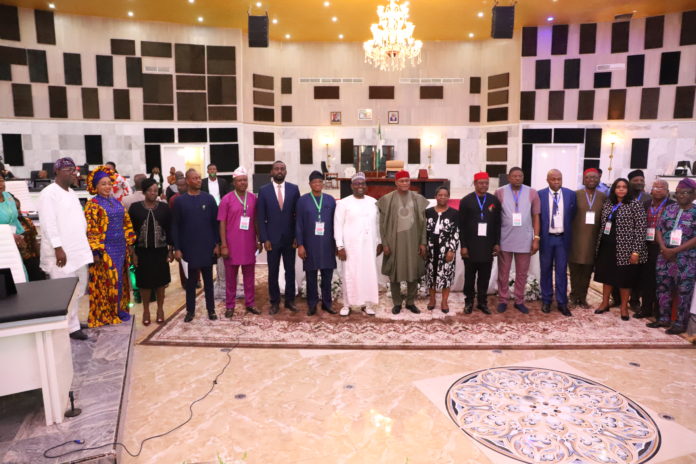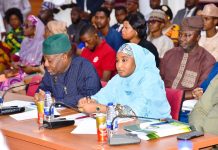
The 21st Joint Planning Board (JBP)/National council on Development Planning (NCDP) conference has commenced on Wednesday (April 6, 2022), in Abakaliki, Ebonyi State.
The theme of this year’s conference is: “Good Governance and Institutional Capacity: Pathway to Sustainable National Development.’’
The forum is a gathering of Commissioners and Permanent Secretaries of Economic Planning at the Sub-national including critical Stakeholders for brainstorming and plans formulation with a view to proposing policy options that would enhance the economy.
Declaring the occasion open, the Governor of Ebonyi State, Engineer David Nweze Umahi, stated that in line with the theme of the conference, the Government of Ebonyi State placed high priority on good governance and sustainable development.
He claimed that this was evident in the testimonies of the changed narratives of the state.
Represented by his Deputy Governor, he added that the State Government was mindful of the economic challenges facing the country and also the need to institutionalize good practice.
He said the state had attained success on this score.
He tasked all participants both physical and virtual to follow all the proceedings and make input for the good of Nigeria.
Speaking earlier, the Permanent Secretary, Budget and National Planning, who is also the Chairperson of the Board, Mrs Olusola Idowu, noted that the theme of this year’s gathering was apt, considering the fact that Nigeria, for many decades, had been faced with a lot of challenges working against her development as a nation.
Some of the challenges, she stated, included: weak institutions, policy inconsistencies, mono-cultural dependence on oil, weak coordination mechanism, and lack of attitudinal change, among others.
Idowu stated that sustainable development hinged on the total commitment of both the leadership and followership, adding that both parties must work together to achieve the desired goals of the country.
She also stressed that ’’pursuant to sustainable national development, accountability, transparency, efficiency and rule of law at all levels are crucial’’.
The Permanent Secretary therefore charged stakeholders to brainstorm on the theme of the meeting, relating institutional capacity to governance at all levels and proffering policy options while taking into cognizance the peculiarities of the country to remedy the development challenges.
Her words: ‘’ I urge you to make use of the meeting and come up with far-reaching recommendations that when implemented, would improve the socio-economic development of Nigeria.”
She lauded the Government of Ebonyi State for demonstrating an exemplary leadership quality in the delivery of dividends of democracy to the people of Ebonyi State, particularly in the areas of road construction, provision of quality education, health care services, Agriculture and strong collaboration with the Federal Ministry of Finance Budget and National Planning.
Also speaking, the Chairman, Commissioners of budget and economic planning forum (CoP), Hon. Solomon B. Elisha who is the Commissioner, Ministry of Budget and Economic Planning, Taraba State, reiterated that the JPB/NCDP event would always provide the platform for robust discussions of ideas and recommendations that would lead to sustainable national development.
In the light of the theme, he said, ‘’Good governance is essential for sustaining economic transformation in developing countries. However, many developing countries currently lack the capacity as opposed to the will, to achieve and then sustain a climate of good governance.
“The lack of good governance has been demonstrated to have corrosive effects on the development process. Such poor governance has been shown, among other things to undermine democracy, subvert the rule of law, entrench corruption, scare of foreign investment.’’
He noted that capacity had been identified as one of the missing links in Africa’s development and democratization.
According to him: “In the context of governance, capacity entails the ability of an institution of governance – the legislature, executive, judiciary, civil society or private sector – to perform its constitutionally or politically mandated functions or roles efficiently and effectively.”
Therefore, he advised: ‘’As we pursue capacity development for good governance, both national and sub-nationals must ensure that such initiatives are comprehensively designed to be simultaneously related to change and transformation at the individual, institutional and societal levels and to be owned and controlled locally.’’
The Director General/Nigeria Governors Forum (NGF) who was represented by the Senior Economist of the Forum, David Nabena, stated that ‘’Good governance is a tailwind for sustainable development, as it creates an environment for the rule of law, accountability, transparency, inclusiveness, responsiveness, and efficiency in government administration.’’
“Institutional capacity on the other hand, portends a great opportunity to leapfrog through the pathways of development, even in environments where good governance tenets were not fully entrenched,” Nabena maintained.
He also pledged that NGF was poised to contribute its own quota to national development within the ambit of the law.
According to him: ‘’We will do our best to ensure the full implementation of the suggestions and resolutions that will be put forward as outcomes of the conference.”




